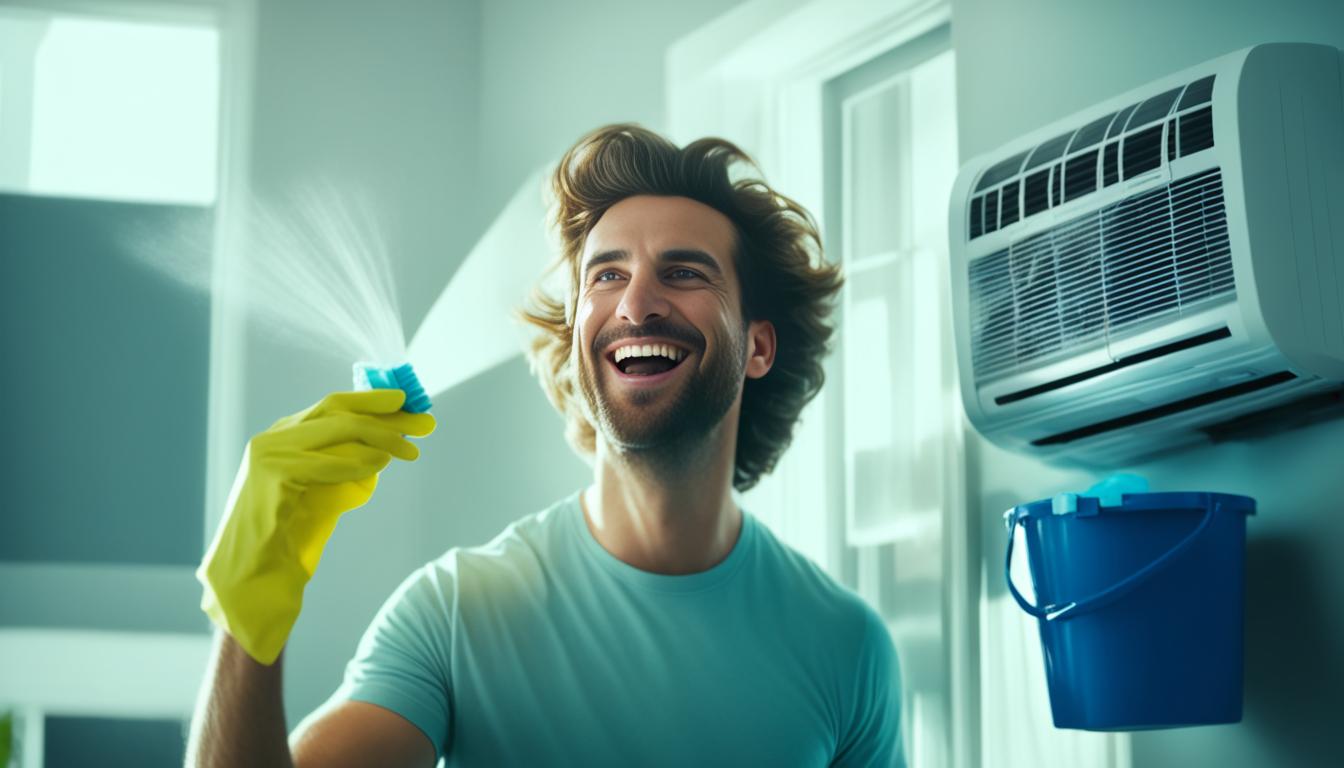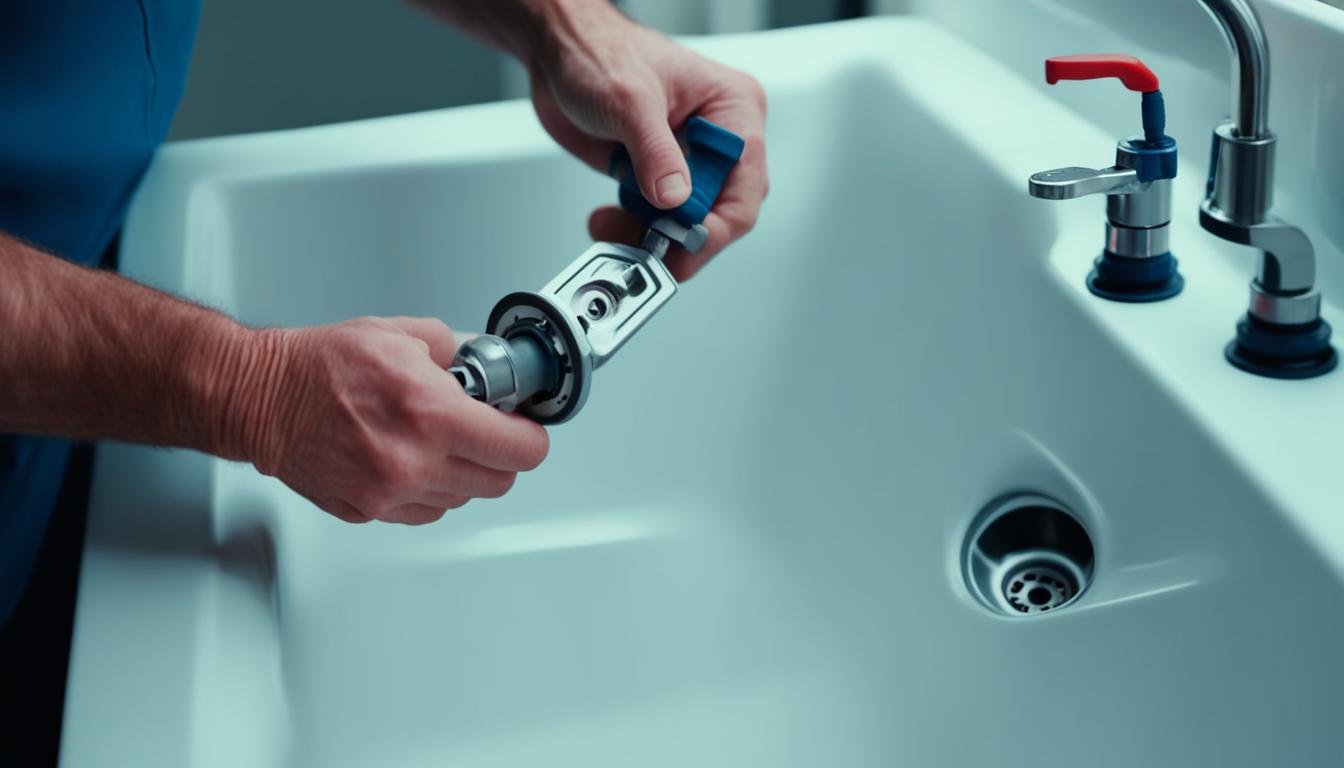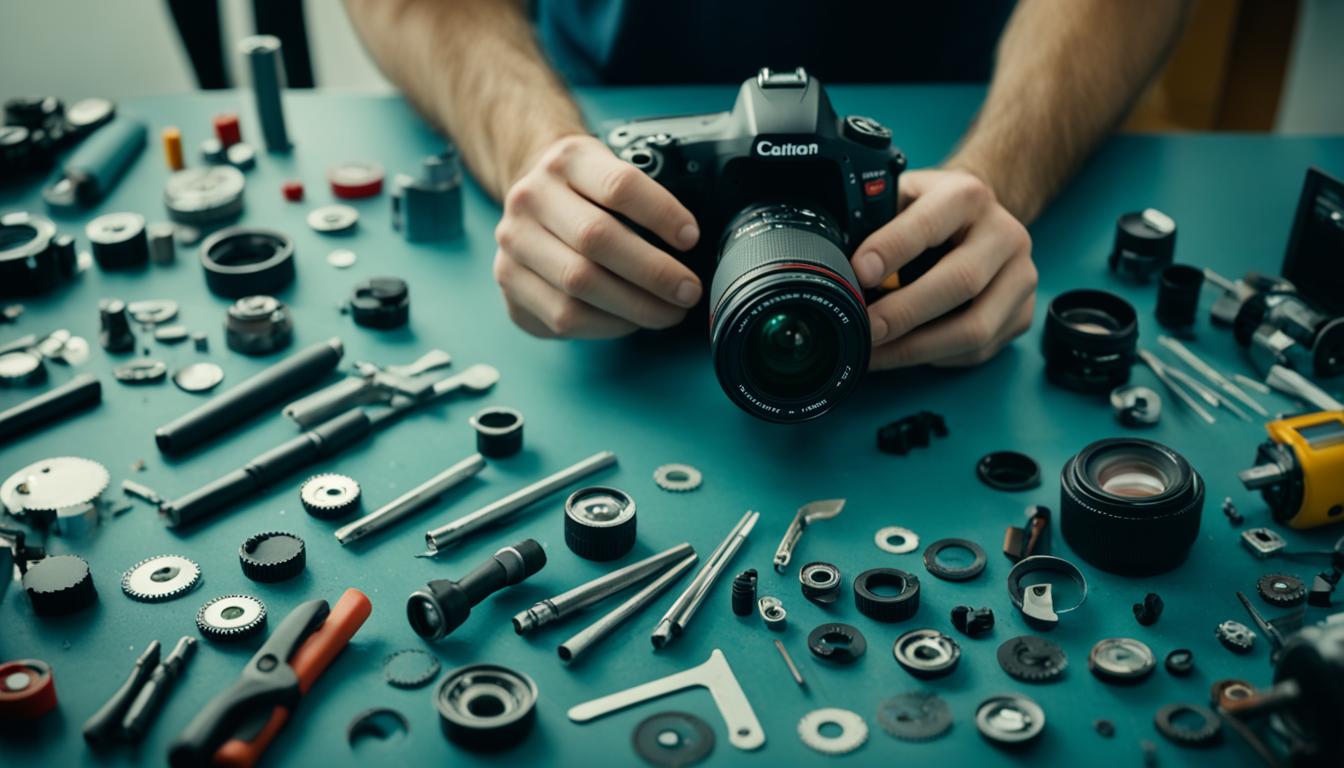Keeping your home air conditioner in good shape is key. It helps your AC last longer, improves air quality, and works better. Regular upkeep keeps your AC running well and saves you money on big repairs later. This guide will give you simple tips to keep your HVAC system running smoothly.
If you’re a homeowner, knowing how to maintain your AC is important. These easy tips will help keep your home cool and comfy all year. Whether you’re new to HVAC or have been doing it for years, these tips will help.
Understanding Your Home Air Conditioner
To fully grasp the value of your air conditioning system, it’s crucial to understand its basic components and the various types available. This knowledge helps in ensuring optimal HVAC system functionality. It also guides you to make informed decisions for maintenance and upgrades.
The Basics of AC Systems
Your home air conditioner has key components like the condenser, evaporator, compressor, and refrigerant. The compressor is the heart of the system. It moves the refrigerant between the condenser and evaporator, making heat transfer possible. This process is key for keeping your home cool, whether you have a central AC unit, split systems, or other air conditioning units.
Types of Air Conditioning Units
Air conditioners come in different forms to meet various needs:
- Central AC Units: These systems cool your whole home by sending air through ducts. They offer consistent temperature control.
- Split Systems: Split systems are common in homes. They split into two or more units – the compressor outside and the air handler inside. They provide energy-efficient cooling.
- Portable Air Conditioners: These units are great for temporary cooling. They are mobile and don’t need to be installed permanently. They’re a versatile option for cooling specific areas.
Knowing these types and their benefits helps you choose the best system for your home. Whether you’re thinking of upgrading or fixing issues, this knowledge is key.
Importance of Regular AC Maintenance
Regular AC maintenance is key for many reasons. It makes your AC last longer by keeping it in top shape. When you service your air conditioner often, it works better and lasts longer. Plus, it’s less likely to break down completely.
Regular maintenance also makes your AC use less energy. Clean filters and well-kept coils mean your system uses less power. This leads to lower energy bills and helps the environment.
“An air conditioning unit operating efficiently can save up to 15% on energy costs annually.” — Energy.gov
Regular maintenance also stops expensive repairs before they start. Catching small problems early means you avoid big repairs or even replacing the whole unit. This is especially helpful during hot summer months.
Here’s why regular AC maintenance is a good idea:
- Extended AC unit longevity
- Improved energy efficiency
- Reduced risk of costly repairs
- Consistent cooling performance
Putting in a bit of effort to keep your AC running well can save you a lot of money and trouble. It makes your home more comfortable and gives you peace of mind.
| Benefit | Description |
|---|---|
| Longevity | Keeping all parts well-maintained and functional increases the lifespan of your AC unit. |
| Energy Efficiency | Regular maintenance ensures optimal performance, leading to lower energy consumption and reduced bills. |
| Cost Savings | Preventive care helps avoid expensive emergency repairs or replacements, saving money over time. |
Checking and Replacing Air Filters
Keeping your home’s HVAC air quality is key for health and efficiency. It’s important to check and replace your air filters often. This keeps your system running well and the air inside your home clean and fresh. Knowing when and how to replace AC filters can really help.
When to Replace Your Air Filters
You should change AC filters every 1-3 months, depending on your usage and the filter type. If you notice your airflow is down or see dust around your vents, it’s time for a change. Homes with pets or people with allergies might need filters changed more often to keep the air clean.
Step-by-Step Guide to Changing Filters
- Turn off the AC unit to ensure safety.
- Find the air filter, usually in the return air duct or near the blower.
- Take out the old filter and note its size for the new one.
- Put in the new filter, making sure it fits well and airflow arrows match.
- Turn the AC unit back on for better air quality.
Benefits of Clean Air Filters
Replacing and keeping air filters clean has many benefits. It makes the air in your home cleaner, removing pollutants and allergens. Clean filters also make your AC work better, saving energy and cutting down on bills. Plus, they help your air conditioner last longer by stopping dust from clogging it.
“A small investment in clean air filters can lead to significant savings on energy bills and maintenance costs while ensuring a healthier indoor environment.”
Cleaning Condenser Coils
Keeping your air conditioner’s condenser coils clean is key for its performance and life. Regular maintenance and proper cleaning boost your HVAC system’s efficiency at home.
How to Access Condenser Coils
To get to the condenser coils, follow these easy steps. First, turn off the AC unit’s power for safety. Then, take off the unit’s outer casing with a screwdriver or wrench. Put aside the casing and any screws you find.
Cleaning Methods for Condenser Coils
There are ways to clean the condenser coils. You can use a soft brush to remove dirt gently. Or, try a coil cleaning solution from hardware stores. Spray it on the coils, wait a bit, then rinse with water. For a deeper clean, think about using a special tool or getting professional help.
- Brush away loose debris
- Apply coil cleaning solution
- Rinse with water
- Use specialized cleaning tools, if needed
Impact of Dirty Coils on Efficiency
Not cleaning your AC coils can hurt your HVAC system’s efficiency. Dirty coils block airflow, making your system work harder and use more energy. This can raise your bills and lower cooling power. Over time, it can also lead to breakdowns and expensive fixes.
| Maintenance Task | Benefit |
|---|---|
| Regular cleaning | Enhanced HVAC efficiency |
| Using appropriate tools and solutions | Extended lifespan of AC unit |
| Removing dirt and debris | Lower energy consumption |
| Professional servicing | Prevention of costly repairs |
Inspecting and Cleaning the Evaporator Coil
Keeping your air conditioner in top shape is key. During an air conditioner inspection, it’s vital to check the evaporator coil for dirt and damage. This part, inside the air handler or near the furnace, gets dusty and can break down over time.
First, turn off the unit’s power for safety. Then, take off any panels to see the coil. Look for dirt or damage. If it’s dirty, clean it with a soft brush or vacuum.
For a deeper clean, use a coil cleaner made for AC systems. Keeping the evaporator coil clean boosts airflow and makes your air conditioner work better. Make sure to include evaporator coil maintenance in your air conditioner inspection routine for best results.
- Turn off the power before inspecting the evaporator coil
- Remove access panels to view the coil
- Use a soft brush or vacuum for light cleaning
- Apply coil cleaner for deeper cleaning
- Reassemble and restore power to test the unit
Tuning Up the Thermostat
Setting your thermostat right is key for saving energy and staying comfortable at home. Knowing how to adjust and calibrate your thermostat can make your air conditioner work better and cut down on energy bills.
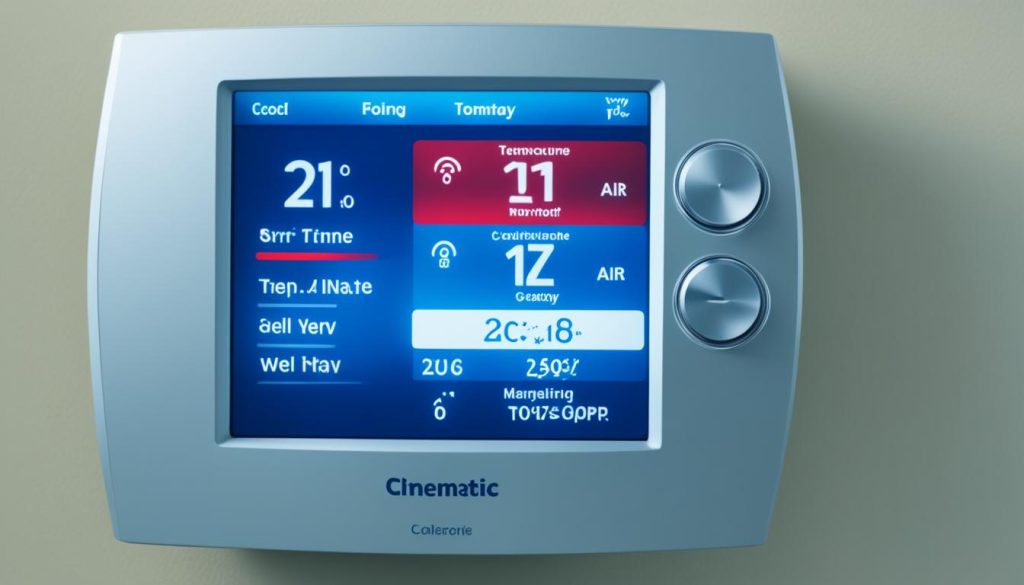
How to Adjust Your Thermostat Settings
Getting your thermostat calibrated right is important for the right indoor temperature. Begin by matching the thermostat’s reading with a trusted indoor thermometer. If they don’t match, check the manual for calibration steps. Regular checks prevent wasting energy and help your optimal AC operation.
Here are some tips for different seasons:
- Summer: Keep the thermostat at 78°F (26°C) when you’re home and higher when you’re out.
- Winter: Set it to 68°F (20°C) when you’re home and lower when you’re asleep or away.
The Role of Programmable Thermostats
Switching to a programmable thermostat brings many advantages, like better temperature control and saving energy. With a programmable thermostat, you can set different temperatures for different times. It adjusts automatically based on your schedule and preferences.
Programmable thermostats offer:
- Energy Efficiency: It cuts energy use when you’re not home.
- Increased Comfort: Your home is at the perfect temperature when you get back.
- Cost Savings: You’ll see lower energy bills and less wear on your AC.
By getting good at thermostat calibration and using programmable thermostat benefits, you can enjoy unmatched comfort and efficiency. This ensures your optimal AC operation all year.
Maintaining Refrigerant Levels
Keeping your air conditioner in top shape means making sure the refrigerant levels are right. This boosts AC performance and avoids expensive repairs later.
Identifying Low Refrigerant Indicators
Spotting low refrigerant signs early can prevent bigger problems. Look out for these signs:
- Reduced cooling: Your AC cools your home less or takes longer to do so.
- Increased energy bills: A sudden rise in electricity costs means your AC is working too hard due to low refrigerant.
- Ice buildup: Ice on the refrigerant lines or evaporator coil signals low refrigerant levels.
- Hissing sound: A hissing or bubbling noise may mean a refrigerant leak.
The Importance of Proper Refrigerant Levels
Having the right refrigerant levels is key for your AC to work well. It helps the AC absorb and release heat efficiently, keeping your home cool and comfortable. It also stops putting too much strain on the system, which can cause breakdowns and high repair costs.
Always have a professional do a refrigerant recharge. They will measure and refill the refrigerant accurately, making sure it’s at the right level for your AC.
| Symptom | Description | Solution |
|---|---|---|
| Reduced Cooling | AC takes longer to cool your home | Check refrigerant levels, recommended refrigerant recharge |
| Increased Energy Bills | Unexpectedly high electricity costs | Inspect for refrigerant leaks, possible recharge required |
| Ice Buildup | Ice forming on refrigerant lines or coil | Consult a professional to check and recharge refrigerant |
| Hissing Sound | Noises indicating a refrigerant leak | Immediate professional inspection and likely refrigerant recharge |
How to Maintain Home Air Conditioner
Keeping your home air conditioner in good shape might seem hard, but it’s easier than you think. Just follow a simple AC upkeep routine and avoid common mistakes. This will help your unit work better and last longer.
Essential Maintenance Checklist
- Inspect and replace air filters regularly
- Clean condenser and evaporator coils
- Check and clean the blower fan
- Ensure refrigerant levels are adequate
- Verify thermostat accuracy and settings
- Clear debris around the outdoor unit
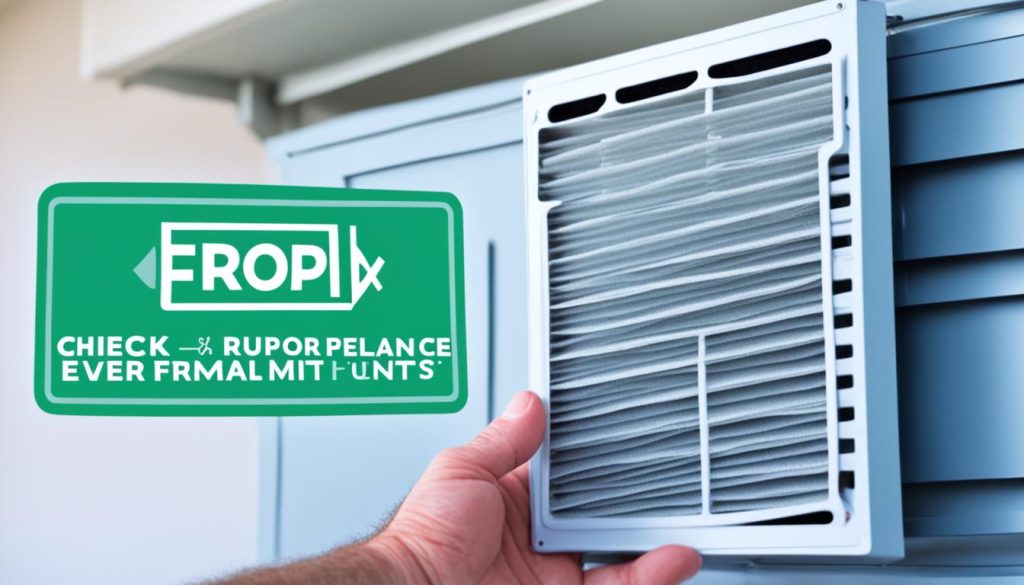
Common Mistakes to Avoid
When you do your own AC maintenance, watch out for mistakes that can harm your system. Here are some big no-nos:
- Forgetting to turn off the power before cleaning or inspecting your AC
- Using the wrong type of filter or neglecting to change it regularly
- Failing to clean condenser and evaporator coils
- Ignoring unusual noises or leaks, which could indicate larger issues
- Attempting refrigerant refills without proper knowledge or equipment
Stick to a regular AC upkeep routine and avoid these mistakes. This way, your air conditioning will run smoothly all year.
When to Seek Professional Help for AC Repairs
Your air conditioner is a complex machine that needs an expert’s touch when it breaks. Knowing when to call for professional HVAC repair can save you time, money, and stress. We’ll explain when it’s time to get AC technician assistance.
Unusual noises from your AC are a big sign it needs help. Sounds like banging, clanking, or screeching mean parts inside are loose or broken. If you ignore these sounds, the damage could get worse and cost more to fix.
If your AC blows warm air instead of cool air, it’s a problem. This could be due to low refrigerant or a broken compressor. Trying to fix it yourself is not a good idea. It’s better to call an AC technician to find and fix the real issue.
Irregular cycles are another warning sign. Your AC should work consistently, no matter the weather. Fast cycling might mean electrical problems or a faulty thermostat. These issues need professional HVAC repair.
Moisture and leaks around your AC are serious signs. Water or refrigerant leaks could mean blocked drainage or damaged tubes. These problems need quick AC technician assistance to prevent mold and water damage to your home.
Foul smells from your AC mean there could be mold or burnt wires. These issues affect your comfort and health. Getting professional HVAC repair is key to solving these problems safely.
A sudden increase in your energy bills without using more energy means your AC is working too hard. This inefficiency is usually due to mechanical problems. Getting professional HVAC repair is crucial to fix this.
If your AC is over ten years old and breaks down a lot, it might be time for a new one. A technician can advise you on what’s best for your home and budget.
| Warning Sign | Description | Professional Solution |
|---|---|---|
| Unusual noises | Banging, clanking, or screeching sounds | Internal inspection and component repair |
| Blows warm air | Airconditioning fails to cool | Refrigerant level check and compressor repair |
| Rapid cycling | AC cycles on and off quickly | Electrical diagnostics or thermostat replacement |
| Moisture and leaks | Visible water or refrigerant leaks | Drain blockage clearing and tube repair |
| Foul smells | Odors from mold or burnt wires | Mold removal and wiring inspection |
| Energy bill surge | Unexpectedly rising energy costs | System efficiency assessment and mechanical repair |
Recognizing these signs early and getting AC technician assistance can stop small problems from getting bigger. Trusting your AC to a pro ensures it works well, lasts longer, and keeps you comfortable.
Seasonal HVAC Servicing
Seasonal HVAC maintenance is key to making sure your air conditioner works well all year. With the right care, your unit will last longer and keep your home comfy in any season.
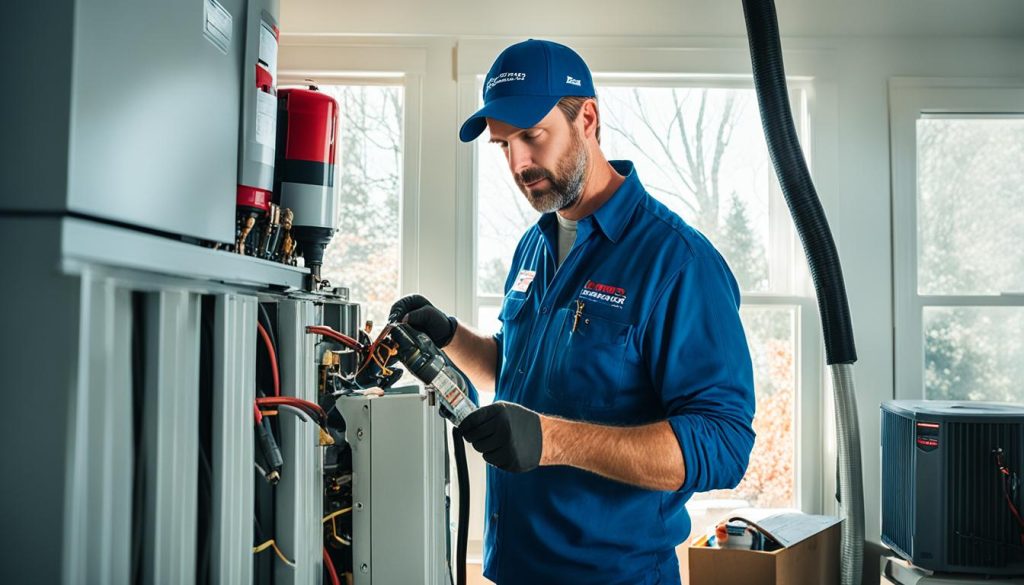
Preparing Your AC for Summer
Getting your AC ready for summer is vital to dodge breakdowns during the hot months. Here are steps to prepare your AC:
- Clean or replace air filters to boost airflow and efficiency.
- Inspect and clean the condenser coils for better heat exchange.
- Check refrigerant levels and add more if needed to avoid cooling problems.
- Adjust your thermostat for precise temperature control.
- Book a professional maintenance check to spot and fix issues early.
Winterizing Your AC Unit
When winter comes, it’s crucial to winterize your air conditioner to shield it from harsh weather. Doing so helps prevent damage and ensures it starts up well when summer hits:
- Turn off the unit’s power to stop it from turning on by mistake.
- Clean the unit well, removing debris that could harm it over winter.
- Use a cover that lets air breathe to keep snow, rain, and ice away without trapping moisture.
- Insulate any exposed pipes to stop them from freezing and breaking.
- Book a seasonal AC check early in spring to make sure it’s ready for summer.
Seasonal AC maintenance, including getting ready for summer and winterizing, is crucial. It keeps your system running well and efficiently all year.
Tips for Energy-efficient Cooling
Making your home cool without spending too much is key. Using simple steps can cut down on cooling costs and keep your AC running well.
Energy-saving Tips and Tricks
Simple changes can greatly improve your AC’s performance. Here are some easy tips for better energy-efficient cooling:
- Set Your Thermostat Wisely: Raise the thermostat when you’re out to save money. Set it to 78°F when home and higher when away.
- Use Ceiling Fans: Ceiling fans help spread cool air, letting you up the thermostat by 4°F without losing comfort.
- Seal Leaks: Seal any duct leaks and make sure windows and doors are closed to keep cool air in.
- Maintain Your AC: Clean or replace air filters and keep condenser coils clean for better efficiency.
- Utilize Blinds and Curtains: Close blinds and curtains during the hottest hours to block heat and ease your AC’s load.
Upgrading Your AC for Better Efficiency
Upgrading to high-efficiency AC systems can be a smart move. New air conditioners have features that cool better and use less energy.
Think about these points before getting a new AC:
- Energy Star Rating: Choose units with a high SEER rating for better energy use.
- Smart Technology: Look for smart thermostats and sensors that adjust cooling based on your habits and the weather to save money.
- Proper Sizing: Make sure the new AC fits your home right. The wrong size can be inefficient and increase bills.
Switching to a more efficient AC can cut your energy use and improve cooling. Always talk to a professional HVAC expert to find the best option for you.
Improving Indoor Air Quality
Keeping the air in your home clean is key to a healthy living space. Using air purifiers and proper ventilation can greatly improve the air quality. Let’s look at how to make your indoor air better.
The Role of Air Purifiers
Air purifiers are great at removing harmful particles from the air. They help make the air cleaner by taking out dust, pollen, mold spores, and pet dander. Having an air purifier means breathing easier and staying healthier, especially for those with allergies or asthma.
Ventilation Strategies
Good ventilation is important for keeping indoor air clean. It helps spread out pollutants and brings in fresh air. Simple steps like opening windows, using exhaust fans, and installing whole-house ventilation systems can make a big difference. Adding air purifiers to these methods offers a complete solution for clean, healthy air at home.
Conclusion
Keeping your home air conditioner in good shape is key for its best performance and long life. By following the simple tips in this article, you can make your AC work better, improve the air quality inside, and save money on repairs. It’s important to check and replace air filters, clean the coils, and adjust the thermostat regularly.
Also, watch the refrigerant levels and get your HVAC checked every season. Knowing when to call a pro for big issues is also crucial. This guide shows how important regular maintenance is for a smooth-running AC.
By following these tips and saving energy, you can keep your home cool and lower your bills. Taking care of your AC also makes your home healthier. Start these maintenance habits and see a big change in your AC’s performance and efficiency.
